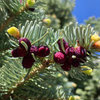Picea glauca 'Caerulea' pronunciation please
ken_adrian Adrian MI cold Z5
15 years ago
Related Stories

INSPIRING GARDENSA Contemporary Landscape With Lush, Layered Plantings
Biodiversity, seasonal interest, an enticing path and outdoor living areas are a few highlights of this Toronto yard
Full StorySponsored
Zanesville's Most Skilled & Knowledgeable Home Improvement Specialists
More Discussions











dcsteg
pineresin
Related Professionals
Garden City Landscape Architects & Landscape Designers · Canton Landscape Contractors · Hartford Landscape Contractors · Edmond Landscape Contractors · Belvedere Park Landscape Contractors · Deerfield Landscape Contractors · Del Aire Landscape Contractors · Little Ferry Landscape Contractors · Mission Viejo Landscape Contractors · Oakland Landscape Contractors · Paterson Landscape Contractors · Rancho Santa Margarita Landscape Contractors · Ronkonkoma Landscape Contractors · West Orange Landscape Contractors · Chicago Ridge Landscape Contractorsken_adrian Adrian MI cold Z5Original Author
pinetree30
ken_adrian Adrian MI cold Z5Original Author
tunilla
Embothrium
pineresin
Embothrium
tsugajunkie z5 SE WI ♱
pineresin
gardengal48 (PNW Z8/9)
barbaraincalif
ken_adrian Adrian MI cold Z5Original Author
barbaraincalif
pinetree30
Embothrium
greenman28 NorCal 7b/8a
dcsteg
lcadem
Embothrium
lcadem
ken_adrian Adrian MI cold Z5Original Author
Embothrium
Sara Malone Zone 9b
Embothrium
Embothrium
ken_adrian Adrian MI cold Z5Original Author
albarten